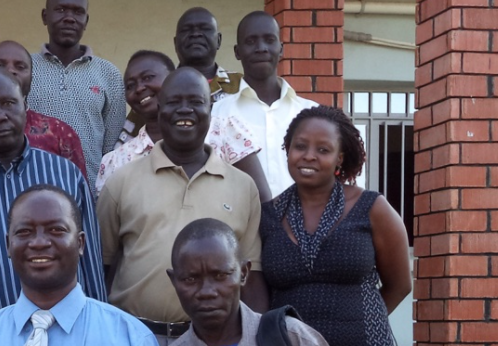On the front lines of research
Uganda’s largest institution of higher learning boosts usage of evidence-based information through Research4Life.
As a young student, Caroline Kobusingye was planning a career in counseling. “My passion is to help people and I thought that was the best way to do it,” she says. Working in a university library during school vacations convinced her that library science is also an extremely valuable means of helping people achieve their goals.
Now a librarian at Makerere University, Caroline guides faculty, students, medical workers and researchers to the evidence-based information they need to promote health and development and achieve their goals.
As a national e-resources coordinator, Caroline often travels outside of the capital Kampala to provide training in Research4Life and other electronic resources. She urges librarians at the institutions she visits to sign up for Research4Life and guides them through the registration process.

Recently, Caroline brought her information technology skills to the University of Juba in South Sudan where she trained librarians, lecturers and researchers to use Research4Life programmes under a temporary arrangement. South Sudan became an independent state in July 2011 following a referendum. Since mid-December 2013, growing political instability has created significant challenges for the country.
Most did not know that Research4Life existed, this introductory workshop was a starting point. They saw that Research4Llife could help them access important publishers with journals their institution could not afford. They were looking forward to more training, but unfortunately they went back into war.
At Makerere University, Caroline works at the institution’s main library, known as Maklib, which oversees nine college libraries, the libraries of the medical and other schools and a book bank system.
The use of electronic resources at Makerere has flourished in recent years. Research4Life logins soared from 4,500 in 2008 to more than 14,000 in 2012.
A large, new extension has significantly increased library space and the University has invested heavily in computers. Uganda’s largest institution of higher learning provides continuous e-resource training for its students, faculty, and researchers. New students get training during orientation. A two-week information management course devotes a full session to the use of Research4Life programmes and their importance.
When students begin to tackle class work, they really see the reason to learn about Research4Life resources and they come to the librarians for more training, Caroline says. She advises users conducting literature searches to venture beyond the boundaries of the Research4Life programme designated for their area of study. “I tell them HINARI is for health, AGORA is for agricultural and OARE is for the environment but not to have a biased mind because they can get a lot of information from all of the Research4Life resources.”
Makerere University added ARDI as a resource at the end. Caroline says the programme designed to encourage the development of new solutions to technical problems needs a ‘friendlier interface’ so that more people will use it. “It is not user friendly so many researchers go back to HINARI or AGORA,” she explains, “But ARDI is scheduled to launch a new user interface in early 2014 that matches the other programmes, which should make these researchers happy.”
Caroline also urges for more training in Research4Life for librarians. “Training for the trainers builds confidence,” she says, “Once you show users that you don’t know, they will not come back to you.”
In contrast, librarians who are proactive and make it clear to users that they are ready and able to assist are recognised as crucial academic assets. Caroline remembers a master-level agricultural student who was struggling to find material for his dissertation. After teaching him to navigate Research4Life, the student told Caroline he believed he could complete his work within a year.
“He came back later to tell me he had submitted his dissertation and was awaiting approval,” she reveals. This concrete example illustrates what Caroline considers the biggest rewards of her profession.
“The joy as a librarian is seeing people achieve their goals because these students want to study and finish their research and a lot of them are stuck,” she says, “It is a great thing to help people achieve what they set out to achieve when they have lost hope.”
This story is part of the “Unsung Heroes: Stories from the Library” case study collection. Read more stories from Research4Life users.





